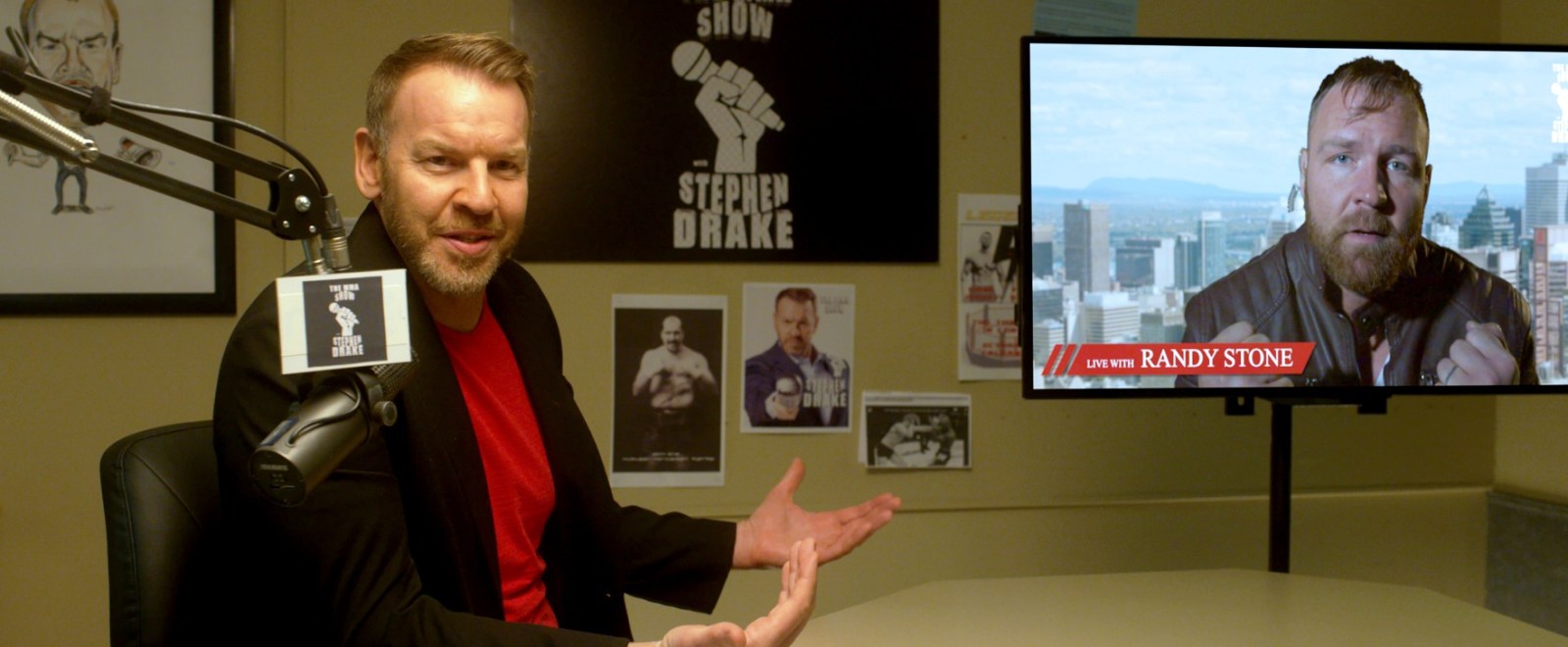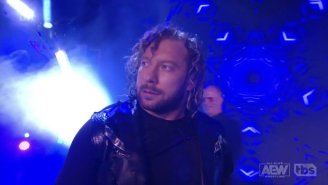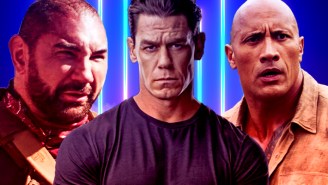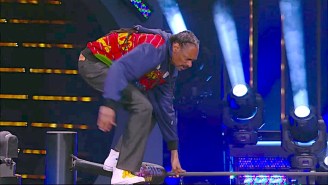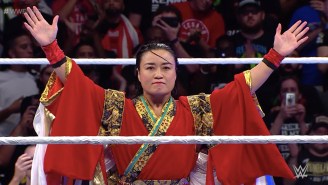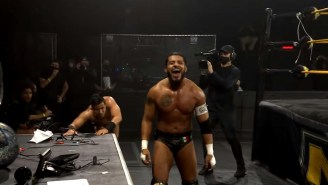After decades of wrestling stardom as WWE‘s Christian and TNA’s Christian Cage, Jay Reso is making moves in other parts of the entertainment industry. Since he worked his last match in 2014, Reso has been a podcaster, actor, TV host, and more. One of his recent projects: executive producing and acting in the movie Cagefighter: Worlds Collide.
With Spandex talked to Reso about Cagefighter, which will premiere on Fite TV on May 16, his life after wrestling, and more. He kicked off the conversation by asking, “How’s things?”
With Spandex: They’re pretty good. How are they with you?
Jay Reso: It’s alright. This quarantine is stressing me out, but I’m trying to stay busy.
How are you spending your quarantine?
Mostly homeschooling my daughter. It takes up most of the day, so I have a whole new respect for teachers at this point.
Had you ever tried to do something like homeschooling before or is this new territory?
This is all new. They send assignments, and then she has like a Zoom class with her friends in the class every day so she sees them at least but, you know, it’s just kind of hard to get her to focus at home, you know? But we’re getting through it.
So I have some questions for you about Cagefighter. You’re an executive producer and an actor in the movie. How did you get involved with the project?
Yeah, so a couple of years ago I had done an independent movie in Saskatchewan, the same place that this movie was shot, for a guy named Hugh Patterson, called SuperGrid. And we kept in contact, and then one of the producers of this movie, Shayne Putzlocher, is friends with Hugh, and they were discussing this movie, and he was like “Oh, you should talk to Jay, he’s a wrestler and there’s some wrestling elements in this film. You should pass it along to him and have him talk a look at it.” So I read the script over and just made a few suggestions and they asked me to come on board as an executive producer… That’s kind of how I got involved with it.
As an executive producer, did you help out a lot with the wrestling aspect of the movie?
Yeah, just the wrestling things that were in the script, I just made some suggestions on those things and that was basically what I contributed to it.
I talked to Jon Moxley about the movie and he said you reached out to him about his role. Did you think that he would right person for the part, or how did you end up reaching out to him?
I think we were just discussing who would be the role and he popped into my head just with the type of character that this was, and just the demeanor and the way that he talked and the kind of attitude just felt very much to me like this was the guy. And it just so happened that right around the time we were casting, he became a free agent, so we obviously talked to him and he was interested, and he came on board, and it worked out.
When you’re working in other parts of the entertainment industry, what are the biggest misconceptions you see people have about wrestling?
I think it’s changed somewhat for the better over the last few years with The Rock and John Cena and now we see Dave Batista doing big things in Hollywood, kind of getting past that stigma of just being the big, kind of bruiser, Bouncer #2 type characters. I think that’s going to help a lot. I guess there was a stigma sort of attached to being a wrestler before. Now I think a lot of people that you see in prominent positions in entertainment maybe grew up as wrestling fans, kind of during that boom period of the late 90s and the Monday Night Wars and when wrestling really started to build up to where it is now. I think that’s helped out a lot as well.
And I think that, you know, the cool thing about wrestling to me is it’s sort of like an entertainment boot camp. You’re on live TV every single week, so you’re working without a net, so you understand having to have your stuff down because there’s no second take. And you’re playing a character when you go up there on television on a weekly basis, so I think all those things kind of go hand in hand, and I think it’s really kind of changed the way the entertainment industry looks at wrestlers.
Wrestling seems like such a life-consuming career. When you realized you were going to leave, how did you find your path for life after wrestling?
Well, it’s just having the foresight. I think like any athlete, your shelf life is only so long and at a certain point you realize that what happens in the ring, it might be a big part of your life, but it’s just going to be that part of your life. You have to figure out what the next step is after that.
And I don’t know, I always felt like I was capable of doing other things. I wanted to try different aspects of things. I stepped away and Edge and I did a podcast for quite a bit of time and that was a lot of fun and a different challenge, and we wrote, produced, and starred in The Edge and Christian Show, two seasons of that on the WWE Network. I hosted a show on the History Channel called Knight Fight for a season; I had a couple parts in a couple TV series and things like that. I wanted to just not go back to one thing, but kind of be multifaceted, I guess you could say.
The goal, kind of the same as my mindset for wrestling, was work with people who are better than you. That’s how you get better. Wrestling’s an art form. It’s a way to create and be creative and be artistic in a sense and it’s kind of like a creative outlet. Trying to find that outlet that kind of fills that void when you step out of the ring, for every person, it’s different. And so yeah, I just wanted to try different things. Especially when, like you said, wrestling is consuming, and when you’re on the road 250, 300 days a year it’s hard to try different things, so when that travel schedule kind of goes away, it’s almost kind of hard to just get re-acclimated back into normal life, so you’re always trying to find things to keep yourself busy as well.
What’s the most difficult thing about getting re-acclimated to normal life?
For me, it was relaxing. Whenever I was home, it was always for two, maybe three days a week, and I’d sit down on the couch and be like, “Oh, I forgot I need to do this” and then get up and do it and then sit down. So I really had a hard time just sitting down and relaxing because that short amount of time I had at home, I was always trying to get things done or see people, just trying to make the most of every minute you were home, so it was kind of hard to just sit and relax. To get used to thinking “All that stuff will be here tomorrow. I don’t have to worry about it so much,” so I could actually put my suitcase away in the closet was strange.
And I know you had different types of injuries that led you to retire, but did Edge coming back to wrestling earlier this year make you think about coming back to wrestling at all?
No, I mean, not really. I was surprised when he told me that was what he was working towards and that’s what was going to happen. My injuries are much different than his. He had a neck injury and I had concussion issues that caused me to retire, so it’s two completely different injuries altogether. So I’m pretty content with what I accomplished in my career, and I’ve moved on to the next phase.
Is there anyone working in WWE who you would like to work with if you were still wrestling, who’s really stood out to you in that way?
Oh yeah. There’s always guys who you watch their matches and go “Man, I could have really torn it up with this person.” I think of a guy like Sami Zayn, who very much had a similar kind of style, or a guy like Kevin Owens, or even in NXT you see guys like Adam Cole or Tommaso Ciampa or Johnny Gargano, you know. Aleister Black is another guy. So yeah, there’s always guys that make me go, “Man, I could have a great match with that guy.”
I noticed you mentioned some of the smaller guys on the roster, and you did Light Heavyweight Championship stuff early in your career…
I won the Light Heavyweight Championship in my very first match in WWE, yeah.
It seems like WWE’s opinion on what is the right size for a top guy wrestler has changed over the past few decades. Do you know how did they become more amenable to smaller wrestlers than before?
I’m not sure, but honestly, I think that MMA might have had a lot to do with that; smaller weight class guys main-eventing, drawing big crowds. A guy like George St-Pierre or someone like that. I think that might have changed the mindset a little bit, but also, like anything, it evolves, and it becomes more of an athletic thing… I think more than size, it’s having the complete package, a personality that the audience can grab onto. If you think back, Roddy Piper wasn’t the biggest guy in the world, but he had a larger than life personality, which, you know, made him what he was, and I think when you can tie all those things together – but like I said, I think it’s just a sign of the times, that as we become better-conditioned athletes it becomes more of an athletic type presentation, I think.
Working with current WWE performers on The Edge and Christian Show, was there anyone who stood out to you as someone who would be great for an entertainment career outside of wrestling?
Yeah, I mean, so many. We just had such a fun time with it. We had a very light script, so we left a lot of room for ad-libbing and for all the Superstars to kind of make it their own and have some fun with it, and there was no pressure. You know, I think a guy like Bray Wyatt would be an obvious one with the work that he does now and the stuff on The Edge and Christian Show. The comedic stuff he did was just unbelievable. Off the top of my head, I think of a guy like him. I also think Renee Young, she was in one skit that we did, and she was hilarious as well. She’s another one that stands out to me.
I think I have one last Cagefighter question for you. It looks like the movie has an MMA vs. pro wrestling dynamic. What do you think would be the ideal relationship between the MMA and wrestling worlds?
Honestly, I don’t see it as wrestling vs. MMA. I think it’s an MMA movie and it’s just very relevant to what we’ve seen here happening the past few years with wrestlers kind of crossing over into MMA. You think of Brock Lesnar or CM Punk or more recently Jake Hager. I think it’s a very relevant subject at this point in time because it’s actually happening. Bobby Lashley crossed over to MMA too for a little bit…
I think that a part of this movie is that there’s always this feeling from MMA purists and MMA fighters that wrestling is fake and they’re not real athletes, and there’s that element to this movie. But what it really boils down to is, it’s entertainment. Whether it’s pro wrestling or whether it’s an MMA fight, it’s still entertainment. You have a live crowd there and audiences watching at home and they want to be entertained. It’s the same tree, different branches, is really what it is.
And you see MMA fighters borrowing from pro wrestling. You see them taking their personas and adding them to their pre-fight hype routines and their entrances and their promos, the way they talk smack to their opponents, those are all very much borrowed from pro wrestling. And wrestlers, on the other hand too, like you didn’t have tapping out in wrestling before MMA. So I think they borrow elements from each other understanding that at the end of the day, it’s entertainment.

